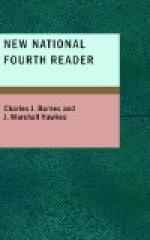When they enter a house they clear it of all living things. Cockroaches are devoured in an instant. Rats and mice spring round the room in vain. An overwhelming force of ants kill a strong rat in less than a minute, in spite of the most frantic struggles, and in less than another minute its bones are stripped. Every living thing in the house is devoured.
They will not touch vegetable matter. Thus they are in reality very useful, as well as dangerous, to the natives, who have their huts cleaned of all the abounding vermin, such as immense cockroaches and centipedes, at least several times a year.
When on their march the insect world flies before them, and I have often had the approach of an ant-army heralded to me by this means. Wherever they go they make a clean sweep, even ascending to the tops of the highest trees in pursuit of their prey.
Their manner of attack is an impetuous leap. Instantly the strong pincers are fastened, and they let go only when the piece gives way.
At such times this little animal seems animated by a kind of fury which causes it to disregard entirely its own safety, and to seek only the conquest of its prey. The bite of these ants is very painful.
The natives relate that in former times it was the custom to expose criminals in the path of these ants, as the most cruel way that was known of putting them to death.
* * * * *
Directions for Reading.—Name the emphatic words in the last paragraph of the lesson, and mark the inflections.
In determining upon the emphasis to be given to the words of a sentence, the only guide we have to follow is the meaning. We must ask ourselves, “Which, words are of special importance to the meaning?”
* * * * *
Language Lesson.—Change each of the sentences given below to statements, expressing as nearly as possible the same meaning.
“What troubles you to-day?”
“Tell me at once what the matter is!”
“Let us shout for Meccatina, and its mountains bare and brown!”
Model.—“What is your name?” changed to the form of a statement, becomes—“I wish you to tell me your name.”
Let pupils write four questions, and then change them to statements, expressing as nearly as possible the same meaning.
* * * * *
LESSON LXXV.
plun’dered, stripped of their goods by force.
surge, a rolling swell of water; billows.
verge, extreme side or edge.
sheer, straight up and down.
frag’ments, pieces; small portions.
vis’ion scene; imaginary picture.
a byss’, chasm; deep space.
phan’tom, ghost; airy spirit.




